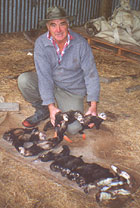Ferret control and possum control go hand in hand. Basically ferrets are just one link in the chain of disease transmission, and stock infection. It seems possums are the source of infection, and ferrets a link as they scavenge on possum carcasses dead or dying from TB. In addition, sick TB affected possums tend to head into the open and often during daylight hours. A dozy, badly infected, sick possum sitting in a paddock is like a magnet to curious deer or cattle.
A simple ferret trap can be made in the form of a wooden box about the size of a shoe box, with a 70mm hole in one end and no floor to it. This can be set over a victor, or similar trap, set to the back of the box. It is important to bait the trap properly. Place a small piece of rabbit, chicken or fishy material behind the trap, so the ferret has to get on the trap in going for the bait. Set traps along the edges of drains, creeks, rivers, dams and small animal runs, under fences and beside tracks on drainpipes, under tracks, hay barns, and on clear areas under trees and leading ridges. Place traps alongside culverts, inside holes or tunnels such as rabbit burrows, clay pipes or between hay bales.
Ferrets can be caught any time of the year with the highest kill rate being in February through to late May. However it is wise to follow a 12 month programme. Trapping sites should be adjusted over winter to take in any sheltered dry situations such as hay barns.
Initially use bait such as meat or fish. However once a ferret is caught, the smell of that ferret seems to attract others to the trap. Brian Charlott has had the greatest success locally using fresh eel as bait.
Thanks to Brian Charlett, who is a private contractor and licenced operator, currently contracting for Southern Pest Management, who has over 30 years experience in the control of ferrets, possums and rabbits, for the content of this article
